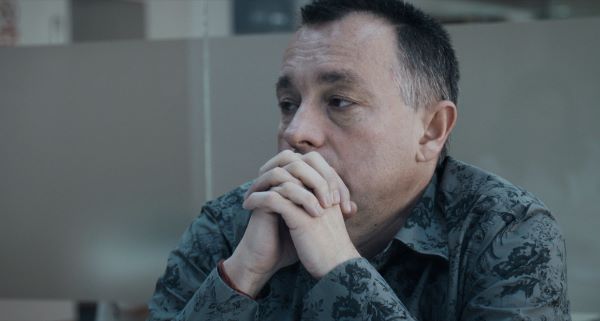

Alexander Nanau’s taut, thrilling documentary is Romania’s 2020 entry for the Best International Feature Academy Award, and what a powerful contender it is. The film quietly and methodically exposes a network of hair-raising corruption that astonishes at first, then lets the shock sink in as deeper and deeper levels of rot come to the surface.
Although Collective will affect casual viewers, it bristles with moments bound to send a frisson or two through those with a little knowledge of Romanian history. In one scene, a defective surgical disinfectant linked to unnecessary deaths ends up for analysis in a box innocuously labeled “ICECHIM.” In the notorious Ceausescu regime, ICECHIM was the science institute that obsequiously touted the dictator’s wife, Elena Ceausescu, as Romania’s leading doctoral research chemist, never mind she was an uneducated peasant who had barely finished the fourth grade.
Elena died by firing squad more than 30 years ago, but some things never change. Collective unveils a medical establishment consumed by kickbacks and insider dealings, haughtily boasting that it conforms to the highest European standards while sentencing to death too many of those unfortunate enough to wind up in its hospital beds. As it turns out, ICECHIM’s lab credentials may even be suspect.
Collective opens with a group of people holding back tears as they recall the fate of loved ones injured and killed in a terrible 2015 fire at a nightclub called Colectiv. Sixty-four perished in total. Why did 37 die after hospitalization, some with manageable injuries? The question absorbs Catalin Tolontan, an underdog reporter with a small sports newspaper. The film follows the no-drama Tolontan as he persistently questions officials and puts a slick health minister on the spot.
He and his team also pinpoint a lethal link in the health care supply chain: diluted disinfectants sold by pharmaceuticals dealer Hexi Pharma. Cleansing agents turned out to be watered down 10 times more than recommended. Burn victims’ wounds treated in hospitals soon teemed with maggots, or patients simply died from bacterial infections. Further investigations reveal a trail of bribes leading to certification boards, hospital management, and the Bucharest mayor’s office. “This story is so mind-blowing people are going to think we’re crazy,” murmurs an insider.
Or be driven crazy. Massive crowds took to the streets and brought down the Romanian government over the cover-up, something the film could have made a bigger deal of, although that would be out of keeping with its low-key style. After the scandal breaks, the film undergoes a gearshift from covering the more dramatic shoe-leather reporting stage of the crisis to the its more sober, difficult phase: What is to be done? And in a system so compromised, who has the authority to do it?
The filmmakers have extraordinary access to the new interim health minister charged with cleaning up the mess. Vlad Voiculescu is calm, soft-spoken, and willing to listen to angry whistleblowers. Appalled at the DNA-deep sleaze he finds, he nevertheless tries to keep his cool. One gets the sense that Voiculescu does a lot of living in his own head. Here in the United States, it’s tempting to draw comparisons to a detached Obama-like figure facing the Trumpian ghouls of Romanian politics, blowhards who denounce unflattering reports as fake news, blame journalists for being hysterical, and boast that Romania’s medical system handled a public health disaster just fine. Sound familiar? Voiculescu is saddled with a situation he had nothing to do with, and it’s unclear how such a youthful, guileless neophyte can prevail—or if the craven guilty will ever pay for their trespasses.
Collective delves into the bureaucratic details of a social issue, but never loses sight of the human cost of corruption. It silently follows the parallel story of Tedy Ursuleanu, a young woman scarred by burns, quietly trying to learn to use an artificial hand and rebuild her life. Voiculescu meets with her, but her burdens are mostly borne alone. Doctors grapple with remorse, and families silently mourn their dead. Collective looks closely at power games, pain, and the search for truth. Its approach is understated, but its gaze unwavering.






Leave A Comment